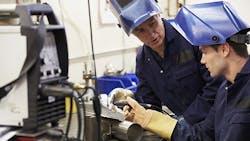Remedy the Skills Gap with Apprenticeship Programs
While the public is focused on growing jobs in the United States, what’s in dire need of a spotlight is the importance of cultivating a skilled workforce. A 2015 report by the Manufacturing Institute states nearly 3.5 million manufacturing jobs will need to be filled over the next decade and two million are expected to go unfilled due to a major lack of skilled candidates.
This alarming shortage of trained workers in the U.S. today points to a clear disconnect between the reality of the job market and the training options available to young adults. Colleges may be churning out students who know things, but today’s job market requires candidates who can do things. Between years of employment declines, outsourcing and an outdated perception among parents and educators that manufacturing is a poor career choice, the manufacturing industry is facing an uphill battle.
Education and industry must work together to address this gap. According to Secretary of Labor Thomas E. Perez, “over the course of the last couple of decades, we have regrettably and mistakenly devalued apprenticeships and training” as a nation.
MTU America is an off-highway diesel engine manufacturer that is part of a Rolls-Royce Power Systems unit headquartered in Germany. Having a foot on German and American soil simultaneously gives MTU a global perspective with an internationally inspired tool belt. MTU America’s apprenticeship curriculum is based on German methods and the test that apprentices take at the end of the program is the same test their German peers undergo.
MTU America’s Aiken, South Carolina, plant began its U.S.-based apprenticeship program in 2012 out of pure necessity—it was made possible through partnerships with local high schools and technical career centers. Since its inception, MTU has had more than thirty students go through the program. While our numbers are small, the impact we are making is significant.
At graduation, MTU apprentices are already experienced members of the workforce with a solid resume, robust technical repertoire and important soft skills. With this foundation, apprentices can pursue high-paying full-time employment with MTU or other area manufacturers, or continue their education at 2- and 4-year institutions.
Since the establishment of MTU’s program in South Carolina, MTU has since expanded its apprenticeship program to Minnesota’s thriving manufacturing base. MTU Onsite Energy, MTU’s generator set manufacturing arm, established the Youth Employment Acceleration Program (YEAP), an ambitious youth apprenticeship program in partnership with Mankato Area Public Schools, South Central College and area manufacturers to help create a pipeline of skilled and confident workers. Armed with German roots and learnings from MTU’s South Carolina-based program, YEAP provides high school students a structured hands-on training system that offers the rare opportunity to earn a wage while gaining marketable work skills, laying the groundwork for their future.
Perfectly positioned at the intersection between knowledge and training, apprenticeship programs are ideal talent incubators. The positive outcomes of skills training are many: Stronger communities, a skilled and confident workforce and an increase in the number of career opportunities for our young people. Other industry leaders must follow suit lest the shortage continue to grow because one thing is certain—without a skilled workforce, manufacturing job creation will be for naught.
Jeremy Diebel is senior machining manager and apprenticeship coordinator at MTU America.
